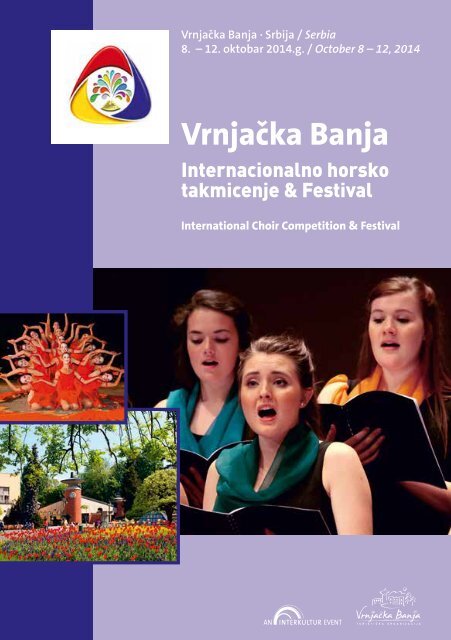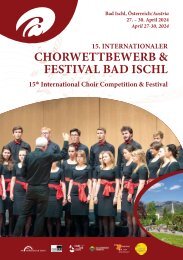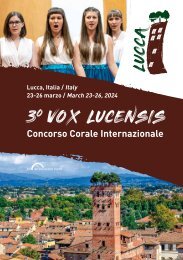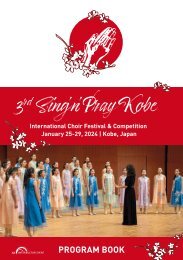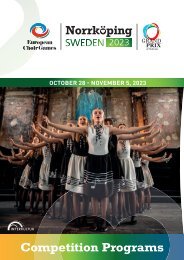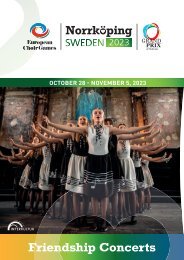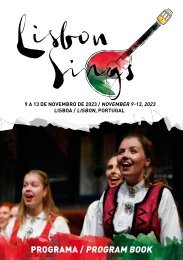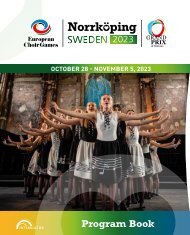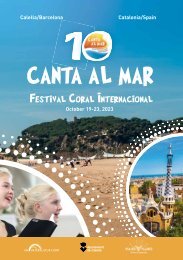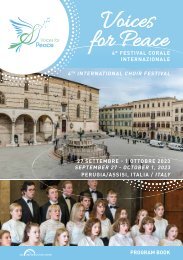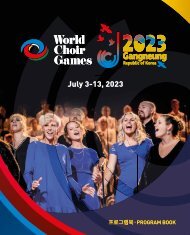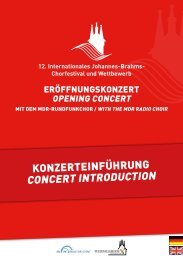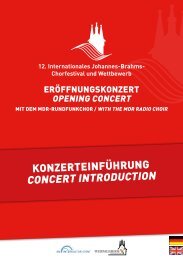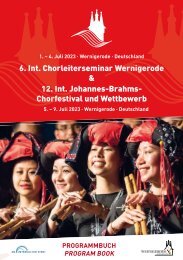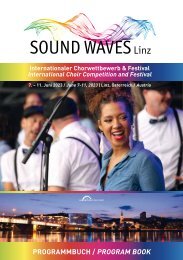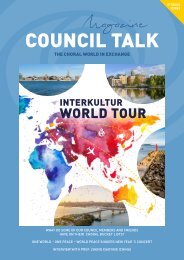International Choir Competition and Festival Vrnjačka Banja 2014 - Program Book
This event is the first INTERKULTUR choir competition in Serbia. Choral music was one of the first encounter possibilities for the Balkan countries after the wars of the 90s. The regional choral scene features many international activities. Vrnjačka Banja is the most popular spa town in Serbia. The therapeutic effect was probably renowned already in the 2nd century. As a cultural center, the city is also well known for its concerts, literature meetings and the colorful carnival parade.
This event is the first INTERKULTUR choir competition in Serbia. Choral music was one of the first encounter possibilities for the Balkan countries after the wars of the 90s. The regional choral scene features many international activities.
Vrnjačka Banja is the most popular spa town in Serbia. The therapeutic effect was probably renowned already in the 2nd century. As a cultural center, the city is also well known for its concerts, literature meetings and the colorful carnival parade.
Create successful ePaper yourself
Turn your PDF publications into a flip-book with our unique Google optimized e-Paper software.
<strong>Vrnjačka</strong> <strong>Banja</strong> · Srbija / Serbia<br />
8. – 12. oktobar <strong>2014</strong>.g. / October 8 – 12, <strong>2014</strong><br />
<strong>Vrnjačka</strong> <strong>Banja</strong><br />
Internacionalno horsko<br />
takmicenje & <strong>Festival</strong><br />
<strong>International</strong> <strong>Choir</strong> <strong>Competition</strong> & <strong>Festival</strong>
2<br />
Photo Credits: 1 © Studi43 | 2 © INTERKULTUR | 3 © Kevin Husted
3<br />
Internacionalno horsko takmicenje &<br />
<strong>Festival</strong> <strong>Vrnjačka</strong> <strong>Banja</strong><br />
<strong>International</strong> <strong>Choir</strong><br />
<strong>Competition</strong> & <strong>Festival</strong> <strong>Vrnjačka</strong> <strong>Banja</strong><br />
8. – 12. oktobar <strong>2014</strong>.g., <strong>Vrnjačka</strong> <strong>Banja</strong>, Srbija<br />
October 8 – 12, <strong>2014</strong>, <strong>Vrnjačka</strong> <strong>Banja</strong>, Serbia<br />
Manifestacija organizacije INTERKULTUR / An INTERKULTUR event<br />
Organizator / Organizer<br />
INTERKULTUR Management GmbH<br />
U saradnji sa / In cooperation with<br />
Grad <strong>Vrnjačka</strong> <strong>Banja</strong> / the city of <strong>Vrnjačka</strong> <strong>Banja</strong><br />
Pokroviteljstvo / Patronage<br />
Tomislav Nikolić – President of the Republic of Serbia<br />
Predsednik organizacije INTERKULTUR / President INTERKULTUR<br />
Günter Titsch<br />
Umetnički odbor / Artistic Committee<br />
Prof. Dr. Ralf Eisenbeiß (Nemačka / Germany)<br />
Johan Rooze (Hol<strong>and</strong>ija / The Netherl<strong>and</strong>s)<br />
Aleks<strong>and</strong>ar S. Vujić (Srbija / Serbia)<br />
INTERKULTUR Board<br />
Günter Titsch (Nemačka / Germany)<br />
Wang Qin (Kina / China)<br />
Stefan Bohländer (Nemačka / Germany)<br />
Prof. Dr. Ralf Eisenbeiß (Nemačka / Germany)
5<br />
Tabela sadržaja / Table of contents<br />
Strana / Page<br />
Organizator / Organizer 3<br />
Tabela sadržaja / Table of contents 5<br />
Zemlje učesnice / Participating countries 6<br />
Dobrodošlica / Greetings 8<br />
• Günter Titsch, Predsednik organizacije INTERKULTUR / President INTERKULTUR<br />
• Tomislav Nikolić, Predsednik Republike Srbije / President of the Republic of Serbia<br />
• Boban Đurovic, Predsednik opštine <strong>Vrnjačka</strong> <strong>Banja</strong> / Mayor of <strong>Vrnjačka</strong> <strong>Banja</strong><br />
O organizaciji INTERKULTUR / About INTERKULTUR 14<br />
• “Povezivanje mostova“ / “Connecting Bridges“<br />
• Statistika / Statistics<br />
O Vrnjačkoj Banji / About <strong>Vrnjačka</strong> <strong>Banja</strong> 24<br />
Umetnički odbor i žiri / Artistic Committee <strong>and</strong> Jury 30<br />
• Ralf Eisenbeiß (Nemačka / Germany)<br />
• Aleks<strong>and</strong>ar S. Vujić (Srbija / Serbia)<br />
• Johan Rooze (Hol<strong>and</strong>ija, Republika Koreja / The Netherl<strong>and</strong>s, Republic of Korea)<br />
• Suzana Kostić (Srbija / Serbia)<br />
• Nicol Matt (Nemačka / Germany)<br />
Sveukupni raspored / General Schedule 38<br />
Takmičenje / <strong>Competition</strong> 46<br />
Horovi / <strong>Choir</strong>s 54<br />
Izdavač & Tim / Imprint & Team 66<br />
Mapa grada / City Map 67
6<br />
Zemlje učesnice / Participating countries<br />
Nemačka / Germany<br />
Rumunija / Romania<br />
Grčka / Greece<br />
Srbija / Serbia<br />
Litvanija / Lithuania<br />
Slovenija / Slovenia<br />
Hol<strong>and</strong>ija / Netherl<strong>and</strong>s<br />
Švedska / Sweden<br />
Norveška / Norway
9<br />
ZEMLJE UČESNICE<br />
GREETINGS
10<br />
Günter Titsch<br />
Predsednik organizacije INTERKULTUR /<br />
President INTERKULTUR<br />
Dragi prijatelji horske muzike,<br />
Želim vam toplu dobrodošlicu u Vrnjačku<br />
Banju, prestižnu banju u Srbiji. Ovo je prvi<br />
festival koji INTERKULTUR organizuje na<br />
Balkanu i u Srbiji. Jako smo srećni što nam<br />
se ukazala prilika da ovaj region uvrstimo u<br />
mapu naših događaja koji se odvijaju širom<br />
sveta. Iskreno se nadamo da će ovaj festival<br />
naići na široko odobravanje publike, posebno<br />
horova u Srbiji i okruženju, kao i ostalih<br />
horova i ansambala koji dolaze da nam se<br />
pridruže i nastupe na našem festivalu.<br />
Već mnogo godina brojni horovi sa Balkana<br />
i iz Srbije učestvuju na različitim manifestacijama<br />
u organizaciji INTERKULTUR-a<br />
širom sveta, u Evropi, Aziji ili SAD-u. Njihovo<br />
učešće je živi dokaz visokog st<strong>and</strong>arda i<br />
kulture koju je horska muzika očuvala do<br />
danas. Slobodno možemo reći da nam je<br />
to bio dovoljan razlog da organizujemo ovu<br />
manifestaciju u Vrnjačkoj Banji, kako bi i<br />
ona zauzela značajno mesto u budućnosti,<br />
među ostalim fascinantnim gradovima u<br />
svetu koji su bili domaćini naših takmičenja.<br />
Ne tako davno, 8. Svetske horske igre u Rigi<br />
završene su neverovatnim uspehom naše<br />
međunarodne zajednice ljubitelja horske<br />
muzike. Ukupno 460 horova iz 73 države<br />
pridružilo se ovom najvećem takmičenju na<br />
svetu za zlatne, srebrne i bronzane medalje<br />
i diplome. A detaljne pripreme za sledeće<br />
takmičenje već su u toku! Tako, na primer,<br />
mi već pozivamo horove iz celog sveta da<br />
nam se pridruže i uzmu učešće u Evropskim<br />
horskim igrama koje će se održati u<br />
Magdeburgu u Nemačkoj, u julu 2015.g.<br />
Veliko mi je zadovoljstvo što počinjemo<br />
saradnju sa Srbijom. Želeo bih da izrazim<br />
iskrenu zahvalnost svim ljudima koji su pomogli<br />
u organizaciji ove prve manifestacije<br />
na ovim prostorima i poželim sreću i prijatan<br />
boravak u Vrnjačkoj Banji svim posetiocima<br />
i ljubiteljima horske muzike.<br />
Günter Titsch<br />
Predsednik INTERKULTUR-a
11<br />
Dear Friends of Choral Music,<br />
I would like to welcome you very cordially<br />
to <strong>Vrnjačka</strong> <strong>Banja</strong>, a prestigious spa town in<br />
Serbia. This is the first festival that INTERKUL-<br />
TUR organizes in the Balkans <strong>and</strong> in Serbia.<br />
It pleases us greatly that we have been given<br />
the opportunity to include this region in the<br />
map of our events that take place all over the<br />
world. We dearly hope that this festival here<br />
will be met with widespread approval in particular<br />
by the choirs in Serbia <strong>and</strong> its neighbouring<br />
countries as well as by all the other<br />
choirs <strong>and</strong> ensembles that travel to join <strong>and</strong><br />
participate in our festivals.<br />
For many years now, a great number of choirs<br />
from the Balkans <strong>and</strong> Serbia have been coming<br />
to the various INTERKULTUR competitions<br />
around the globe, be it in Europe, Asia<br />
or the United States of America. Their participation<br />
is living proof of the high st<strong>and</strong>ards<br />
<strong>and</strong> culture of choral music kept alive in this<br />
region for so long. It is safe to say that this<br />
was more than reason enough for us to organize<br />
this event here in <strong>Vrnjačka</strong> <strong>Banja</strong> in order<br />
to put down a clear marker for the future<br />
<strong>and</strong> with this region being a valuable asset<br />
among the fascinating places around the<br />
world that host our events.<br />
Just a short while ago, the 8th World <strong>Choir</strong><br />
Games in Riga ended with an amazing success<br />
for our international community of<br />
lovers of choral music. A total of 460 choirs<br />
from 73 countries joined <strong>and</strong> competed in the<br />
world‘s biggest choir competition for gold,<br />
silver <strong>and</strong> bronze medals <strong>and</strong> diplomas. And<br />
intensive preparations for the next competitions<br />
are already under way! So, for example,<br />
we are currently inviting the choirs from all<br />
around the world to join us <strong>and</strong> participate<br />
in the European <strong>Choir</strong> Games taking place in<br />
Magdeburg, Germany, in July 2015.<br />
It is a great pleasure for me to see our start<br />
here in Serbia now taking shape. I would like<br />
to express my sincere gratitude to all the<br />
persons that have helped to realise this first<br />
event here <strong>and</strong> I wish good luck <strong>and</strong> an enjoyable<br />
time in <strong>Vrnjačka</strong> <strong>Banja</strong> to all visitors<br />
<strong>and</strong> lovers of choral music.<br />
Günter Titsch<br />
President INTERKULTUR
12<br />
Tomislav Nikolić<br />
Predsednik Republike Srbije /<br />
President of the Republic of Serbia<br />
Добро дошли у Србију у којој се традиција<br />
хорског натпевавања броји вековима, а своје<br />
корене дугује Православном литургијском<br />
појању. Част нам је што ће на мапи света у низу<br />
градова домаћина међународне манифестације<br />
„World <strong>Choir</strong> Games“ бити уписано и име једне<br />
од најстаријих и најугледнијих бања Европе –<br />
Врњачке Бање.<br />
Људски глас – најлепши од свих инструмената<br />
– музиком слави љубав и учи нас хармонији.<br />
Песмом изражавамо своје најдубље емоције<br />
једнаке за све људе светарадост<br />
и тугу , чежњу и носталгију , усхићење,<br />
занос, победу.<br />
Сложену у вишегласно хорско певање,<br />
музиком шаљемо поруке мира и љубави међу<br />
људима. Песмом се разумемо. од музике учимо<br />
да су сазвучје и хармонија међу различитим<br />
гласовима идеал слоге и разумевања међу<br />
различитим културама и народима . Тежимо<br />
визији света као великог хора свих нација<br />
сложеног у хармонији и ведрини песме која<br />
слави живот.<br />
Запевајмо у слози и љубави. Нек игре почну !<br />
Welcome to Serbia, where the tradition of choral<br />
singing competition has for centuries been<br />
held owing its origins to the Orthodox liturgical<br />
chant. We are honored that on the world map<br />
among the number of host cities of the international<br />
manifestation „World <strong>Choir</strong> Games“ will<br />
be also registered the name of one of the oldest<br />
<strong>and</strong> most respected spas of Europe – <strong>Vrnjačka</strong><br />
<strong>Banja</strong>.<br />
The human voice – the most beautiful of all<br />
musical instruments – by music celebrates love<br />
<strong>and</strong> teaches us harmony. With songs we express<br />
our deepest emotions equal for all people in the<br />
world- joy <strong>and</strong> sorrow, longing <strong>and</strong> nostalgia,<br />
delight, enthusiasm, victory.<br />
Packed in polyphonic choral singing, with music<br />
we send messages of peace <strong>and</strong> love among<br />
men. Through songs we underst<strong>and</strong> each other,<br />
from music we learn that the consonance <strong>and</strong><br />
harmony among different sounds are an ideal<br />
of harmony <strong>and</strong> underst<strong>and</strong>ing among different<br />
cultures <strong>and</strong> nations. We strive for a vision<br />
of the world as the great choir of all nations<br />
put together in harmony <strong>and</strong> serenity of a song<br />
that celebrates life.<br />
Let us sing in harmony <strong>and</strong> love. Let the games<br />
begin!<br />
Tomislav Nikolić<br />
President of the Republic of Serbia<br />
Томислав Николић<br />
Председник Републике Србије
13<br />
Boban Đurovic<br />
Predsednik opštine <strong>Vrnjačka</strong> <strong>Banja</strong> /<br />
Mayor of <strong>Vrnjačka</strong> <strong>Banja</strong><br />
Dear participants of the 1 st <strong>International</strong><br />
<strong>Choir</strong> <strong>Competition</strong> <strong>and</strong> <strong>Festival</strong> in <strong>Vrnjačka</strong><br />
<strong>Banja</strong> <strong>2014</strong>,<br />
Драги учесници Међународног хорског<br />
такмичења и фестивала у Врњачкој Бањи <strong>2014</strong>,<br />
Желим Вам добродошлицу у најпознатију бању<br />
у Србији. Желим са де ваши гласови и ваше<br />
појење, из срца Србије, из Врњачке Бање<br />
пронесу широм наше лепе земље , региона<br />
и читавог света...Осећајте се као у свом дому,<br />
као у храму културе и уметности , јер ми смо<br />
деценијама уназад били стециште уметника и<br />
културних стваралаца... Седамдесетих година<br />
прошлог века, југословенско –немачка хорска<br />
недеља одржавала се редовно у Врњачкој<br />
Бањи више од деценију, сада смо домаћини<br />
фестивала Класичне музике, већ четири<br />
деценије овде се одржава Фестивал филмског<br />
сценарија... Своју природну лековитост и<br />
лепоте Врњачка Бања је вековима нудила<br />
свима, мештанима, гостима, младима,<br />
старима, болеснима да оздраве , здравима<br />
да очувају своје здравље, уметницима да<br />
остварују своје замисли... Била је и остала;<br />
лечилиште, одмаралиште, уточиште и место<br />
љубави и уметничка оаза... Врњачка Бања –<br />
краљица српског туризма Вас жељно очекује !<br />
Welcome to the most famous spa in Serbia!<br />
I would like your voices <strong>and</strong> your singing,<br />
from the heart of Serbia, from <strong>Vrnjačka</strong> <strong>Banja</strong>,<br />
to be spread throughout our beautiful<br />
country, region <strong>and</strong> around the world.<br />
Make yourself at home, feel as in a temple of<br />
culture <strong>and</strong> art, because for decades we have<br />
been the meeting place of artists <strong>and</strong> creators<br />
of culture. During the seventies of the<br />
last century, a Yugoslav-German choral week<br />
was regularly held in <strong>Vrnjačka</strong> <strong>Banja</strong> for over<br />
a decade <strong>and</strong> now we host an international<br />
festival of choral music. We are also very<br />
proud about the <strong>Festival</strong> of Film Screenplay<br />
that has been held here for four decades.<br />
For centuries <strong>Vrnjačka</strong> <strong>Banja</strong> has been offering<br />
its natural healing <strong>and</strong> beauty to people<br />
of all ages, residents, guests, the young <strong>and</strong><br />
old, the sick to be healed, healthy people to<br />
maintain their health, artists to realize their<br />
ideas. It was <strong>and</strong> still is: a spa, resort, shelter<br />
<strong>and</strong> a place of love <strong>and</strong> artistic oasis.<br />
<strong>Vrnjačka</strong> <strong>Banja</strong> - queen of Serbian tourism is<br />
looking forward to meeting you!<br />
Boban Đurovic<br />
Mayor of <strong>Vrnjačka</strong> <strong>Banja</strong><br />
Бобан Ђуровић<br />
председник оопштине Врњачка Бања
15<br />
O ORGANIZACIJI INTERKULTUR<br />
ABOUT INTERKULTUR
16<br />
...“Povezivanje mostova“ / … Connecting Bridges<br />
Prvo INTERKULTUR Internacionalno takmičenje horova u Budimpešti 1988.g., bilo je početak<br />
jednog od najvećeg i najuspešnijeg niza kulturnih događaja u Evropi . INTERKULTUR EVENT je<br />
u međuvremenu postala poznata širom sveta po svojim visokim umetničkim i organizacionim<br />
st<strong>and</strong>ardima i kao koncept za horove i ljubitelje horova širom sveta. Ove događaje organizuje<br />
INTERKULTUR, neprofitna organizacija sa sedištem u Nemačkoj.<br />
Najveći uspeh organizacije INTERKULTUR do sada bio je unošenje ideje Olimpijskih igara u hor.<br />
Olimpijada horova 2000.g. u Lincu, Austrija, bila je početak pokreta Olimpijade horova sa kasnijim<br />
nastupima u Busanu, Republika Koreja 2002.g. i Bremenu, Nemačka 2004.g. Ovaj uspeh se nastavio<br />
kao „Svetske horske igre „u Ksiamenu, Kina, 2006.g., Gracu, Austrija, 2008.g., Shaoksingu,<br />
Kina, 2010.g. i Sinsinatiju ,SAD 2012.g.<br />
<strong>2014</strong>.g.manifestacija „Svetske horske igre„ održana je u Rigi , Letonija i označila je najveći<br />
događaj u istoriji horova sa olimpijskim idejama uz 27.000 učesnika. 2016.g. „Svetske horske igre<br />
„će stići do Olimpijskog grada Sočija u Rusiji.<br />
Još jedna prekretnica u istoriji organizacije INTERKULTUR bilo je organizovanje Svetskog<br />
prvenstva za horove . Prvo Svetsko prvenstvo horova debitovalo je 2009.g. u provinciji Gieongnam,<br />
Republika Koreja, a zatim je sledilo i Svetsko prvenstvo za mlade u julu 2011.g. u Gracu, Austrija.<br />
Grac je ponovo bio grad domaćin za INTERKULTUR događaj , jer su tamo održani prvo evropsko<br />
takmičenje horova i „Songs of Spirit <strong>Festival</strong>“ u julu 2013.g. Drugi ciklus ove evropske verzije<br />
„Svetskih horskih igara„ održaće se u Magdeburgu , Nemačka u julu 2015.g.<br />
Ideja<br />
INTERKULTUR je postao simbol jedinstvene umetničke ideje, donoseći nov način interpretacije<br />
na festivalu horova.Za razliku od tradicionalnih akreditovanih horskih takmičenja, na kojima<br />
se takmiče samo elitni međunarodni horovi, INTERKULTUR takmičenja su otvorena i za sve<br />
amaterske horove. Horovi iz svih delova sveta koji žele da steknu međunarodno festivalsko i<br />
takmičarsko iskustvo mogu se takmičiti u rangu svog umetničkog dostignuća. Umetnički odbor
17<br />
stavlja akcenat na prisustvo najvišeg nivoa horskih izvođača, kao i na prisustvo najveće raznolikosti<br />
horova u svim takmičenjima. U poslednje dve decenije brojne organizacije su kopirale ovu<br />
novu vrstu takmičenja. Sa idejom da se svake dve godine organizuju “Svetske horske igre”, ranije<br />
poznate kao „Olimpijada horova“, INTERKULTUR je otvorio vrata novim impulsima i perspektivama<br />
nacionalnih i međunarodnih horskih pokreta.<br />
Pečat kvaliteta<br />
Više od 20 godina MUSICA MUNDI ® predstavlja ekskluzivni pečat kvaliteta svih manifestacija<br />
INTERKULTUR-a u svetu. Sistem rangiranja na kom su bazirana sva takmičenja u organizaciji<br />
INTERKULTUR-a od prvog koncerta 1988.g. u Budimpešti, stalno se usavršava. MUSICA MUNDI ®<br />
garantuje korelaciju među svim manifestacijama, dobru organizaciju, a postavila je i st<strong>and</strong>arde u<br />
svetu horske muzike.<br />
Takmičenja<br />
Postoje različite kategorije svih vrsta i nivoa horova po različitim stepenima težine, sa ili bez obaveznih<br />
komada. Takmičenja nude dobre uslove, vredne umetničke kontakte, razne radionice i seminare,<br />
kao i mogućnosti saradnje sa međunarodnim izvođačima. Više od 200 stručnjaka i vodećih<br />
dirigenata iz celog sveta garantuje visok nivo stručnosti u svim INTERKULTUR događajima.<br />
Sistem evaluacije<br />
Prema sistemu evaluacije MUSICA MUNDI ® , žiri dodeljuje bronzane, srebrne i zlatne diplome<br />
u 10 nivoa u INTERKULTUR takmičenjima uz bronzane, srebrne i zlatne medalje na Svetskim<br />
horskim igrama i Svetskom prvenstvu hora,. U svakoj kategoriji određuje se pobednik ili šampion,<br />
a izuzetna dostignuća se nagrađuju specijalnim nagradama. U nekim takmičenjima postoji velika<br />
nagradna igra u okviru kategorije dobitnika, koja određuje sveukupnog pobednika takmičenja.<br />
Pedagoški koncept<br />
INTERKULTUR događaji nisu samo takmičenja i međunarodne horske svečanosti. Horovi su u<br />
mogućnosti da dobiju povratne informacije u oblasti raznih pedagoških sfera. U okviru evaluacije,<br />
horovi imaju priliku da sarađuju sa međunarodnim članovima žirija i dobiju savete o svom trenutnom<br />
nivou postignuća, stručne pedagoške i umetničke informacije kao i predloge kako da interpretiraju<br />
izabrani komad. Horovi mogu pohađati radionice i seminare i učestvovati na koncertima<br />
“Prijateljstva i Slavlja” koji omogućavaju međunarodnim horovima da nastupaju sa horovima grada<br />
domaćina tokom INTERKULTUR događaja.<br />
Lokacije festivala i takmičenja<br />
Do danas, INTERKULTUR je organizovala nastupe u Austriji, Češkoj, Nemačkoj, Mađarskoj, Indoneziji,<br />
Izraelu, Italiji, Maleziji, Malti, Narodnoj Republici Kini, Republici Koreji, Španiji, Švedskoj,<br />
SAD-u i Vijetnamu. U jesen <strong>2014</strong>.g. nove horske manifestacije održaće se po prvi put u Srbiji.
18<br />
Učesnici<br />
Ukupno, više od 7.600 horova sa oko 340.000 aktivnih pevača iz 100 zemalja učestvovali su u<br />
INTERKULTUR takmičenjima do sada. Interesantno je napomenuti da su više od polovine učesnika<br />
bila deca i mladi do 25 godina starosti.<br />
Sredstva podrške<br />
U skladu sa svojim statutom, INTERKULTUR podržava sledeće aktivnosti:<br />
• Međunarodne muzičke festivale i horska takmičenja čiji je cilj da okupe horove iz različitih<br />
regiona sveta i podstaknu međunarodnu saradnju kroz uzajamno poštovanje, kao i da<br />
doprinesu razmeni kulture i razumevanju među narodima<br />
• Dečje i omladinske horove i iz finansijski osporavanih zemalja<br />
• Amaterske horove koji se fokusiraju na razvoj mladih<br />
• Mlade, talentovane dirigente, mlade muzičare i pevače kroz dodelu stipendija<br />
• Specifične mogućnosti sponzorisanja<br />
Evropska nagrada za kulturu<br />
INTERKULTUR je 2006.g.dobila Evropsku nagradu za kulturu, za aktivnosti u oblasti razumevanja<br />
među ljudima i proširivanju zajedničkog evropskog stava u oblasti kulture od strane bivšeg<br />
nemačkog ministra spoljnih poslova, Hansa Ditriha Genšera, koju joj je uručila Kulturforum Europa.<br />
The first INTERKULTUR <strong>International</strong> <strong>Choir</strong> <strong>Competition</strong> in Budapest, held in 1988, was the start of<br />
one of the largest <strong>and</strong> most successful series of cultural events in Europe. The INTERKULTUR Event<br />
Series has meanwhile become known throughout the world for its high artistic <strong>and</strong> organizational<br />
st<strong>and</strong>ards <strong>and</strong> as a concept for the choirs <strong>and</strong> choir enthusiasts worldwide. These events are organized<br />
by INTERKULTUR, a non-profit organization based in Germany.<br />
INTERKULTUR´s biggest success to date was to bring the antique Olympic idea to the choral community.<br />
The <strong>Choir</strong> Olympics 2000 in Linz, Austria was the beginning of a <strong>Choir</strong> Olympic movement,<br />
with subsequent events in Busan, Republic of Korea in 2002, <strong>and</strong> Bremen, Germany in 2004. This<br />
success continued as the “World <strong>Choir</strong> Games” in Xiamen, China in 2006, Graz, Austria in 2008,<br />
Shaoxing, China in 2010, <strong>and</strong> Cincinnati, USA in 2012. In <strong>2014</strong>, the World <strong>Choir</strong> Games were held in<br />
Riga, Latvia <strong>and</strong> marked the biggest event in the history of the choir Olympic idea attracting 27,000<br />
participants. In 2016, the World <strong>Choir</strong> Games will come to the Olympic city of Sochi in Russia.
19<br />
Another milestone in the history of INTERKULTUR was to establish a World Championship for choirs.<br />
The first World <strong>Choir</strong> Championships debuted in 2009 in the Province of Gyeongnam, Republic of<br />
Korea, followed by the World <strong>Choir</strong> Championships for Youth <strong>and</strong> Young Adults in July 2011 in Graz,<br />
Austria. Graz again was the host city for a INTERKULTUR event, the first European <strong>Choir</strong> Games <strong>and</strong><br />
the “Songs of Spirit <strong>Festival</strong>” were held in July 2013. The second edition of this European version of<br />
the World <strong>Choir</strong> Games will be held in Magdeburg, Germany in July 2015.<br />
The Idea<br />
INTERKULTUR has become the symbol for a unique artistic idea, consisting of a new interpretation<br />
concerning the execution of choir festivals. In comparison to traditional meritorious choir competitions<br />
that only invite international elite choirs to take part; the INTERKULTUR competitions are open<br />
to all non-professional choirs. <strong>Choir</strong>s from all over the world, interested in gaining international festival<br />
<strong>and</strong> competition experience, can compete according to their level of artistic achievement. The<br />
Artistic Committee puts emphasis on the presence of the highest level of choral performers as well<br />
as on the presence of the greatest diversity of choirs in all competitions. This new type of competition<br />
has been copied by numerous organizations in the past two decades. With the idea to organize<br />
the World <strong>Choir</strong> Games, formerly known as “<strong>Choir</strong> Olympics” biennially, INTERKULTUR has opened a<br />
door to new impulses <strong>and</strong> perspectives for the national <strong>and</strong> international choral movement.<br />
The Quality Seal<br />
For more than 20 years, MUSICA MUNDI® has been the exclusive quality seal for all INTERKULTUR<br />
events worldwide. The rating system on which all INTERKULTUR competitions are based upon since<br />
the first event in Budapest in 1988 have been improved continuously. MUSICA MUNDI® ensures<br />
comparability among all events, a smooth organization <strong>and</strong> has set st<strong>and</strong>ards in the world of choral<br />
music.<br />
The <strong>Competition</strong>s<br />
There are various categories for all types <strong>and</strong> levels of choirs in different degrees of difficulty, with<br />
or without compulsory pieces. The competitions offer good competitive conditions, valuable artistic<br />
contacts, various workshops <strong>and</strong> seminars, as well as practice opportunities with international performers.<br />
More than 200 experts <strong>and</strong> leading choirmasters from all over the world guarantee a high<br />
level of expertise in all INTERKULTUR events.
20<br />
Evaluation System<br />
The jury awards Bronze, Silver, <strong>and</strong> Gold Diplomas on 10 levels at INTERKULTUR competitions along<br />
with Bronze, Silver <strong>and</strong> Gold Medals at the World <strong>Choir</strong> Games <strong>and</strong> World <strong>Choir</strong> Championships,<br />
according to the MUSICA MUNDI® evaluation system. In each category, a winner or champion is<br />
determined <strong>and</strong> outst<strong>and</strong>ing achievements are honored with special prizes. In some competitions<br />
there is a gr<strong>and</strong> prize competition of the category winners which determines the overall winner of<br />
the competition.<br />
The Pedagogical Concept<br />
INTERKULTUR events are not just competitions <strong>and</strong> international choir festivals. <strong>Choir</strong>s are able to<br />
receive feedback from various pedagogical offerings. In evaluation rounds, choirs have the chance to<br />
work with international jury members <strong>and</strong> gain advice on their current level of achievement, receive<br />
proficient pedagogical <strong>and</strong> artistic information <strong>and</strong> obtain suggestions as to how to interpret the<br />
chosen piece. <strong>Choir</strong>s may also attend workshops <strong>and</strong> seminars along with participation in Friendship<br />
<strong>and</strong> Celebration Concerts which allow international choirs to interact with choirs of the host<br />
city during INTERKULTUR events.<br />
Locations of <strong>Festival</strong>s <strong>and</strong> <strong>Competition</strong>s<br />
To date, INTERKULTUR events have taken place in Austria, Czech Republic, Germany, Hungary, Indonesia,<br />
Israel, Italy, Malaysia, Malta, People’s Republic of China, Republic of Korea, Spain, Sweden, USA<br />
<strong>and</strong> Vietnam. In fall <strong>2014</strong> a new choral event takes place in Serbia for the first time.<br />
The Participants<br />
In total, more than 7,600 choirs with roughly 340,000 active singers from 100 countries have taken<br />
part in the INTERKULTUR competitions to date. An interesting note is that more than half of the<br />
participants have been children <strong>and</strong> youth up to 25 years of age.<br />
Means of Support<br />
In accordance with its statutes, INTERKULTUR supports the following activities:<br />
• <strong>International</strong> music festivals <strong>and</strong> choir competitions whose goal is to bring together choirs from<br />
different regions of the world <strong>and</strong> encourage international collaboration through mutual<br />
respect, as well as to contribute to cultural exchange <strong>and</strong> underst<strong>and</strong>ing among nations<br />
• Children <strong>and</strong> youth choirs even from financially challenged countries<br />
• Non-professional choirs that focus on the growth of youth development<br />
• Young, talented choirmasters, young musicians <strong>and</strong> singers through the support of<br />
scholarship awards<br />
• Specific sponsorship opportunities<br />
European Culture Award<br />
INTERKULTUR was awarded the 2006 European Culture Award, by former German Minister of Foreign<br />
Affairs, Hans Dietrich Genscher <strong>and</strong> presented by KulturForum Europa, for its activities on behalf<br />
of underst<strong>and</strong>ing between peoples <strong>and</strong> furtherance of common European thinking in the field<br />
of culture.
22<br />
Statistika / Statistics<br />
Place / Country Year Nations <strong>Choir</strong>s Gold Silver Bronze<br />
Budapest (H) 2007 21 50 19 26 5<br />
Linz (A) 2007 14 17 16 5 1<br />
Rome (I) 2007 9 18 9 9 2<br />
Wernigerode (D) 2007 17 40 20 11 –<br />
Venice (I) 2007 12 14 10 5 –<br />
In Canto sul Garda (I) 2007 18 37 24 15 1<br />
Malta (M) 2007 14 18 14 10 –<br />
Jakarta (RI) 2007 12 135 41 71 22<br />
Vienna (A) 2007 14 17 16 9 1<br />
Concorso Corale (I) 2008 13 33 25 12 2<br />
Graz (A) 2008 93 441 232 322 46<br />
Venice (I) 2008 17 32 22 16 3<br />
Vienna (A) 2008 17 26 22 15 1<br />
Budapest (H) 2009 14 46 24 21 5<br />
Venice (I) 2009 17 31 27 16 1<br />
Linz (A) 2009 12 21 11 7 3<br />
Rome (I) 2009 7 11 7 5 –<br />
Gyeongnam (ROK) 2009 32 165 53 53 4<br />
Wernigerode (D) 2009 14 25 16 11 1<br />
In Canto sul Garda (I) 2009 20 35 24 25 3<br />
Malta (M) 2009 10 19 18 5 –<br />
Vienna (A) 2009 11 18 17 9 –<br />
Concorso Corale (I) 2010 13 38 24 16 4<br />
Venice (I) 2010 14 20 19 9 –<br />
Kuala Lumpur (I) 2010 6 13 8 4 –<br />
Shaoxing (PRC) 2010 83 472 140 250 60<br />
Zwickau (D) 2010 7 22 14 7 –<br />
St Louis (USA) 2010 7 17 10 4 –<br />
Vienna (A) 2010 15 16 15 7 –<br />
H ộ i An (VN) 2011 8 31 17 18 3<br />
Budapest (H) 2011 11 52 29 19 5<br />
Venice (I) 2011 16 24 22 10 –
23<br />
Place / Country Year Nations <strong>Choir</strong>s Gold Silver Bronze<br />
Reno (USA) 2011 4 19 11 10 _<br />
Linz (A) 2011 14 20 14 10 1<br />
Rome (I) 2011 12 18 11 8 3<br />
Wernigerode (D) 2011 14 42 28 16 2<br />
Graz (A) 2011 40 120 53 52 6<br />
In Canto sul Garda (I) 2011 16 43 30 27 1<br />
Malta (M) 2011 7 15 11 7 –<br />
Concorso Corale (I) 2012 15 38 33 7 1<br />
Venice (I) 2012 19 37 37 11 –<br />
Vienna (A) 2012 17 33 26 17 5<br />
Cincinnati (USA) 2012 64 362 149 224 43<br />
Calella (E) 2012 28 70 35 46 3<br />
Guangzhou (PRC) 2012 43 164 47 63 11<br />
Huê´ (VN) 2012 5 19 16 9 –<br />
Budapest (H) 2013 20 62 38 30 4<br />
Venedig (I) 2013 17 26 32 4 –<br />
Linz (A) 2013 14 22 23 7 1<br />
H ộ i An (VN) 2013 7 15 12 6 –<br />
Rome (I) 2013 14 21 19 11 –<br />
Graz (A) 2013 35 72 39 34 6<br />
Wernigerode (D) 2013 18 44 29 18 3<br />
Toruń (PL) 2013 8 16 13 9 –<br />
In...Canto Sul Garda (I) 2013 18 36 24 22 4<br />
Manado (RI) 2013 10 140 75 100 10<br />
Calella/Barcelona (E) 2013 19 41 29 20 4<br />
Malta (M) 2013 18 33 22 19 –<br />
Louisville (USA) 2013 2 18 10 8 1<br />
Manila (RP) 2013 3 45 36 23 1<br />
Málaga (E) <strong>2014</strong> 12 16 8 13 1<br />
Bad Ischl (A) <strong>2014</strong> 13 22 14 9 1<br />
Vienna (A) <strong>2014</strong> 14 18 14 6 –<br />
Riga (LV) <strong>2014</strong> 73 460 314 190 26
25<br />
O VRNJAČKOJ BANJI<br />
ABOUT VRNJAČKA BANJA
26<br />
O Vrnjačkoj Banji / About <strong>Vrnjačka</strong> <strong>Banja</strong><br />
<strong>Vrnjačka</strong> <strong>Banja</strong>, najpoznatije banjsko mesto u Srbiji se nalazi 195 km južno od Beograda. Ako se<br />
odlučite da, tokom jula i avgusta, posetite Vrnjačku Banju, starim vozom “Romantika” možete<br />
osetiti neverovatnu avanturu. Takođe možete uživati u šetnjama planinskim stazama obližnje planine<br />
Goč.<br />
Istorija<br />
Ne zna se tačno kada su pronadjeni vrnjački izvori, ali pretpostavlja se da su se vode Vrnjačke<br />
Banje koristile još u ranom antičkom periodu. U prilog ovoj činjenici govori podatak, da su još<br />
1924. godine, pronadjeni delovi bazena iz perioda Rima, neposredno pored današnjeg Rimskog<br />
izvora. U isto vreme pronadjene su i kovanice novca koje datiraju iz perioda pre Hrista, najverovatnije<br />
iz perioda od VI do II veka pre Nove ere.<br />
<strong>Vrnjačka</strong> <strong>Banja</strong> je dobila ime po selu Vrnjci, u kome su I otkriveni mineralni izvori. Pretpostavlja<br />
se da se voda sa ovih izvora koristila za lečenje i u vreme Turske vladavine. Sasvim je izvesno da<br />
su turski vojnici koristili mineralne izvore za lečenje, pa čak i primoravali lokalno stanovništvo da<br />
im služe hranu i piće uključujući i proces samog lečenja. Kako bi izbegli da služe turske begove,<br />
stanovnici sela Vrnjci su zatrpavali lekovite izvore.<br />
Prve lekovite indikacije vrnjačkih voda utvrdjene<br />
su u periodu Kneza Mihajla. Nakon utvrdjivanja<br />
lekovitosti vrnjačkih izvora, započeta je<br />
i prva zvanična turistička sezona u Vrnjačkoj<br />
Banji, daleke 1867. godine, kada je Vrnjačku<br />
Banju posetila gospoda iz ostatka Srbije. Od te<br />
godine, banja je počela naglo da se razvija, a<br />
vidjeniji ljudi iz Srbije su počeli graditi vile u neposrednoj<br />
blizini izvora kao i po okolnim brdima.<br />
Danas su vile ponos Vrnjačke Banje.<br />
Jedna od takvih vila je i poznati Zamak<br />
Belimarković, vila namesnika Belimarkovića,<br />
koja je sagradjena 1886. godine. Vila je sagradjena<br />
u stilu poljskih vila Severne Italije. Danas<br />
je vila muzej i galerija, koja nosi naziv – zamak<br />
Kulture. Nešto ranije, sveštenik Jefimije<br />
Popovića, očaran lepotom Vrnjačke Banje, na<br />
jednom od brda, 1856. godine sagradio je crkvu,<br />
današnu sabornu crkvu Vrnjačke Banje.
27<br />
Znamenitosti<br />
Jedan od današnjih simbola Vrnjačke Banje je vrabac Gočko, sa opancima, obučen u narodnu<br />
nošnju i sa tradicionalnom srpskom kapom (šajkačom) na glavi. Skulptura vrpaca, inače maskota<br />
“Igara bez granica” se nalazi u strogom centru Vrnjačke Banje i idealno je mesto za fotografisanje.<br />
<strong>Vrnjačka</strong> <strong>Banja</strong> ima sedam mineralnih izvora. Četiri se koriste u terapeutske svrhe, a ostale vode<br />
se flaširaju . “Topla voda” je najstariji i najpoznatiji vrnjački izvor. Na osnovu istraživanja utvrdjeno<br />
je da se ova voda koristila još u doba Rima i to u periodu od I do IV veka Nove ere. Zanimljivo je<br />
da je temperatura ove vode 36.5 stepeni i gotovo je identična temperature zdravog ljudskog tela.<br />
Izvor “Jezero” je još jedan izvor tople vode u Vrnjačkoj Banji. Izuzetno je lekovito kupanje u hladnim<br />
vodama izvora “Snežnik” i “Slatina”. Osnovna indikacija vrnjačkih voda je lekovito dejstvo kod<br />
bolesnika obolelih od dijabetesa, bolesti žuči i gastrointestinalnog trakta.<br />
<strong>Vrnjačka</strong> <strong>Banja</strong> is Serbia’s best-known spa, located 195 km south from Belgrade. If you are<br />
heading to <strong>Vrnjačka</strong> <strong>Banja</strong> in July <strong>and</strong> August <strong>and</strong> are feeling adventurous, take the steam<br />
engine Romantika train <strong>and</strong> hop off at the foot of Mount Goč.<br />
History<br />
Though no one knows exactly when <strong>Vrnjačka</strong> <strong>Banja</strong> was discovered, historical records indicate<br />
that the mineral water here was used as early as the Antiquity period. In 1924, portions<br />
of bathing pools <strong>and</strong> an old Roman fountainhead (Fons Fomanus) were uncovered here. In<br />
the same year, archeologists found 500 Roman coins, some dating back to before the time of<br />
Christ, but most from the 2 nd though the 6 th centuries.<br />
<strong>Vrnjačka</strong> <strong>Banja</strong>’s name comes from the village of Vrnjci, where the mineral springs were discovered.<br />
According to legend, <strong>Vrnjačka</strong> waters had known medicinal uses during the Turkish rule.<br />
Some believe that wounded Turkish cavalrymen came into <strong>Vrnjačka</strong> <strong>Banja</strong> for treatment <strong>and</strong><br />
forced locals to feed <strong>and</strong> attend them during their recovery. In an attempt to avoid serving the<br />
Begs (Turkish leaders) some locals apparently tried to bury the springs.<br />
<strong>Vrnjačka</strong> <strong>Banja</strong> flourished during the time of Prince Mihailo. Since its first official season opening<br />
in 1867, <strong>Vrnjačka</strong> <strong>Banja</strong> became a summer vacation spot of the elite. The resort features<br />
a number of beautiful 19 th <strong>and</strong> 20 th century villas around the spring <strong>and</strong> atop the surrounding<br />
hills. Today, they are the pride of <strong>Banja</strong>.
28<br />
One of these stunning structures is the palace of King Regent Belimarković (1886). Built in the<br />
style of a countryside villa in Northern Italy, the palace is now a cultural center <strong>and</strong> gallery<br />
known as the Palace of Culture. The homes on Čajkino hill are especially beautiful. Priest Jefimije<br />
Popović built the small church at the very top of the hill in 1856. He was a great admirer<br />
of the <strong>Banja</strong>’s beauty <strong>and</strong> opened the first spring here in the very same year.<br />
Activities<br />
<strong>Vrnjačka</strong> <strong>Banja</strong>’s symbol is the sparrow wearing Serbian folk shoes (opanci) <strong>and</strong> sporting a<br />
Serbian national hat (Šajkača) on its head. Stroll through the city <strong>and</strong> you will discover a sculpture<br />
of the sparrow in the very center of <strong>Banja</strong>. If you find it, it is m<strong>and</strong>atory that you take a<br />
photo of yourself next to it. Everyone else does!<br />
<strong>Vrnjačka</strong> <strong>Banja</strong> features seven beautiful mineral water springs. Four are used for therapeutic<br />
purposes, <strong>and</strong> two for bottled mineral water. Topla voda (warm water) is <strong>Banja</strong>’s oldest <strong>and</strong><br />
most famous mineral water spring. According to archeological findings, it was used in the Roman<br />
period between the 1 st <strong>and</strong> 4 th centuries. The 36.5°C water of this spring is equivalent to<br />
the temperature of the human body. Jezero is another warm water spring. If you are looking<br />
for a refreshing dip, head to Snežnik (17.5°C) <strong>and</strong> Slatina (14°C), <strong>Banja</strong>’s cold water springs.<br />
Individuals come to <strong>Banja</strong> to find relief from diabetes, bile illnesses, <strong>and</strong> a range of gastrointestinal<br />
illnesses.
31<br />
UMETNIČKI ODBOR I ŽIRI<br />
ARTISTIC COMMITTEE AND JURY
32<br />
Nemačka / Germany<br />
Ralf Eisenbeiß<br />
Umetnički direktor / Artistic Director<br />
Ralf Eisenbeiß je rođen 1952.g. u Zeulenrodi,<br />
nemačkoj saveznoj državi Tiringija.<br />
Nakon srednje škole studirao je pedagogiju,<br />
nemački jezik i muziku. Doktorirao je 1979.g.<br />
na Pedagoškom univerzitetu u Cvikau, Saksonija.<br />
Od 1978.g. do 1981.g. studirao je dirigovanje<br />
horom i orkestrom na konzervatorijumu<br />
Franc List u Vajmaru.<br />
Radio je kao šef katedre za hor na Pedagoškom<br />
univerzitetu u Cvikau i kao profesor horskog<br />
dirigovanja i pevanja 1987.g. Bio je dirigent<br />
proslavljenog Hora Pedagoškog univerziteta u<br />
Cvikau. Sa svojim horom i orkestrom izvodio je<br />
širok repertoar kompozicija za crkvene horove.<br />
Pod njegovom upravom hor je osvojio brojne<br />
nagrade na nacionalnim i internacionalnim<br />
takmičenjima.<br />
Bio je predavač na glavnom seminaru za dirigente<br />
horova u Berlinu i sam je organizovao<br />
brojne radionice. Često se pojavljuje kao gost<br />
dirigent u zemlji i inostranstvu.<br />
Više od 20 godina radi za organizaciju IN-<br />
TERKULTUR. Osnivač je međunarodnog<br />
takmičenja horova, Robert Šuman u Cvikau<br />
i jedan je od osnivača „Svetskih horskih igara<br />
„. Od 1992.g. odgovoran je za oko stotinu<br />
međunarodnih takmičenja u organizaciji IN-<br />
TERKULTUR-a u Nemačkoj, Italiji, Koreji, Indoneziji,<br />
Kini, Austriji, Španiji, SAD-u i drugim<br />
državama.<br />
Čest je član žirija na nacionalnim i internacionalnim<br />
takmičenjima horova širom sveta.<br />
Ralf Eisenbeiß was born in 1952 in Zeulenroda.<br />
After his secondary school examination he studied<br />
pedagogy, German philology <strong>and</strong> musical<br />
education. He received his PhD in 1979 at the<br />
Pedagogical University of Zwickau. From 1978<br />
to 1981, he studied choir <strong>and</strong> orchestra conducting<br />
at the Franz Liszt Conservatory in Weimar.<br />
Ralf Eisenbeiß was working as the director of the<br />
choral department at the Pedagogical University<br />
in Zwickau <strong>and</strong> appointed professor for choir<br />
conducting <strong>and</strong> choral singing in 1987. He was<br />
conductor of the renowned Pedagogical University<br />
Zwickau <strong>Choir</strong>. With his choir he performed<br />
a wide repertoire of compositions for a cappella<br />
choirs <strong>and</strong> with orchestra too. Under his direction<br />
the choir won numerous prizes at national<br />
<strong>and</strong> international choir competitions.<br />
Ralf Eisenbeiß was lecturer at the central seminar<br />
for choral conductors in Berlin <strong>and</strong> organized<br />
numerous workshops himself. He often appears<br />
as guest conductor at home <strong>and</strong> abroad.<br />
Since more than 20 years he works as artistic director<br />
of INTERKULTUR. Ralf Eisenbeiß is founder<br />
of the Int. Robert Schumann <strong>Choir</strong> <strong>Competition</strong><br />
in Zwickau <strong>and</strong> one of the founders of the World<br />
<strong>Choir</strong> Games. Since 1992 he was responsible for<br />
about hundred international competitions of<br />
INTERKULTUR in Germany, Italy, Korea, Indonesia,<br />
China, Austria, Spain, USA <strong>and</strong> other countries.<br />
Ralf Eisenbeiß was very often invited as a juror in<br />
national <strong>and</strong> other international choir competitions<br />
all over the world.
33<br />
Srbija / Serbia<br />
Aleks<strong>and</strong>ar S. Vujić<br />
Umetnički direktor / Artistic Director<br />
Aleks<strong>and</strong>ar S. Vujić je studirao klavir, dirigovanje<br />
i komponovanje na Fakultetu<br />
muzičke umetnosti u Beogradu i diplomirao<br />
je 1983.g. Na istom fakultetu predavao<br />
je od 1974.g. do 2013.g.<br />
1983.g. dobio je nagradu “Zoltan Kodaly“,<br />
a 1988.g. nacionalnu medalju od države<br />
Izrael.<strong>2014</strong>.g. nagrađen je od strane predsednika<br />
Srbije, a u Ameriku je putovao kao<br />
gost države 1987.g.<br />
1987.g. S. Vujić formirao je kamerni orkestar<br />
„Sinfonietta“ Beograd koji je do sada<br />
snimio 12 CD-ova. Uz to, dirigovao je horovima<br />
i orkestrima u Srbiji, a često je bio i<br />
član žirija na različitim događajima u Srbiji,<br />
nekim evropskim zemljama i Aziji.<br />
Kao dirigent osvojio je dve zlatne medalje<br />
na takmičenjima INTERKULTUR organizacije<br />
(“Svetske horske igre” u Busanu<br />
2002.g.i Budimpešti 2009.g.).<br />
Horska dela Aleks<strong>and</strong>ra S. Vujića objavljena<br />
su u Nemačkoj, SAD-u, Italiji, Mađarskoj<br />
i Srbiji, a pevaju se širom sveta. „Synkope“<br />
- B. R.je ekskluzivni izdavač Vujićevih<br />
horskih radova.<br />
Na takmičenju kompozicija u Cvikau<br />
(1995.g.) osvojio je prvu i treću nagradu, a<br />
u Trentu (1993.g.) treću nagradu.<br />
Aleks<strong>and</strong>ar S. Vujić je član Svetskog Saveta<br />
Horova za Srbiju.<br />
Aleks<strong>and</strong>ar S. Vujić studied piano, conducting<br />
<strong>and</strong> composition at the Music University Belgrad<br />
<strong>and</strong> graduated in 1983. He was working<br />
as a professor at the same university from<br />
1974 to 2013.<br />
Aleks<strong>and</strong>ar S. Vujić was awarded the “Zoltan<br />
Kodaly“ medal in 1983 <strong>and</strong> in 1988 a national<br />
medal from Israel. In <strong>2014</strong> he received<br />
an order from the Serbian president <strong>and</strong> travelled<br />
to the USA in 1987 as a state guest.<br />
In 1987 Aleks<strong>and</strong>ar S. Vujić founded the<br />
chamber orchestra “Sinfonietta” Beograd<br />
which recorded 12 CDs until now. Furthermore<br />
he conducted several choirs <strong>and</strong> orchestras<br />
in Serbia <strong>and</strong> was often invited as a juror for<br />
events in Serbia, several European countries<br />
<strong>and</strong> Asia.<br />
As a conductor he achieved two gold medals<br />
at INTERKULTUR events (World <strong>Choir</strong> Games<br />
Busan 2002 <strong>and</strong> Budapest 2009).<br />
Aleks<strong>and</strong>ar S. Vujićs choral works have been<br />
edited in Germany, USA, Italy, Hungary <strong>and</strong><br />
Serbia <strong>and</strong> are being sung in many countries<br />
worldwide. “Synkope” – B. R. Germany is the<br />
exclusive publisher of Vujićs choral works.<br />
At the composition competition in Zwickau<br />
(1995) he achieved a 1st <strong>and</strong> 3 rd prize <strong>and</strong> in<br />
Trento 1993 a 3 rd prize.<br />
Aleks<strong>and</strong>ar S. Vujić is a member of the World<br />
<strong>Choir</strong> Council for Serbia.
34<br />
Hol<strong>and</strong>ija, Republika Koreja /<br />
The Netherl<strong>and</strong>s, Republic of Korea<br />
Johan Rooze<br />
Umetnički direktor i član žirija /<br />
Artistic Director & Jury Member<br />
Johan Rooze je studirao klavir i dirigovanje na<br />
Konzervatorijumu u Utrehtu, Hol<strong>and</strong>ija. Potom<br />
je otišao u SAD da specijalizira džez muziku za<br />
klavir, pevanje i aranžman.<br />
Bio je osnivač i muzički direktor 23 godine vokalne<br />
grupe “Dekoor” na univerzitetu u Utrehtu.<br />
Osvojili su mnoge nagrade – Hol<strong>and</strong>ski<br />
horski festival, <strong>Festival</strong> međunarodnih vokalnih<br />
grupa i TV šou “ Horski idoli”, “Korenslag”<br />
2007 u Hol<strong>and</strong>iji. Bio je i dirigent Studentskog<br />
simfonijskog hora i orkestra Utrehta. Sa ovim<br />
horovima putovao je širom sveta. Osnovao je<br />
“Dudok-Ensemble”, izuzetan projekat hor, bio<br />
je dirigent Bahovih kantata u Utrehtu i gost dirigent<br />
Nacionalnog radio hora.<br />
Bio je profesor džez pevanja, dirigovanja i<br />
aranžmana na Konzervatorijumima u Roterdamu<br />
i Alkmaaru, član odbora Muzičkih savetnika<br />
za Asocijaciju hol<strong>and</strong>ske kraljevske<br />
hrišćanske muzike i umetnički direktor na<br />
Međunarodnom horskom festivalu u Hol<strong>and</strong>iji<br />
2005.god.<br />
2008.god. preselio se u Južnu Koreju i predavao<br />
horsku muziku i džez za klavir na univerzitetu<br />
Yeongnam. Muzički je direktor novog<br />
Džez hora (Yaenoeul Jazz Singers), a 2010.god.<br />
osnovao je profesionalni Daegu studentski hor.<br />
Čest je gost dirigent drugih horova.<br />
Pored horskog rada, veoma je aktivan kao džez<br />
pijanista i aranžer. Radi kao umetnički direktor<br />
za “Interkultur” i često je u žiriju, predaje i vodi<br />
radionice širom sveta.<br />
Johan Rooze studied Piano <strong>and</strong> Conducting at<br />
the Utrecht Conservatory, the Netherl<strong>and</strong>s. Later<br />
he went to the U.S. to specialize in Jazz Piano,<br />
Singing <strong>and</strong> Arranging.<br />
He was founder <strong>and</strong> 23 years Musical Director<br />
of the Utrecht University Vocal Group “Dekoor”.<br />
They won many prices, The Dutch <strong>Choir</strong> <strong>Festival</strong>,<br />
The <strong>International</strong> Vocal Group <strong>Festival</strong> <strong>and</strong> the<br />
“Idols for choir” TV show, “Korenslag” 2007 in<br />
the Netherl<strong>and</strong>s. He was Conductor of the Utrecht<br />
Student Symphonic <strong>Choir</strong> <strong>and</strong> Orchestra.<br />
With these choirs he toured all over the world.<br />
He founded the “Dudok-Ensemble”, an outst<strong>and</strong>ing<br />
Project <strong>Choir</strong>, conducted the monthly Bach<br />
Cantatas in Utrecht <strong>and</strong> was guest conductor<br />
with the National Radio <strong>Choir</strong>.<br />
He was Professor for Vocal Jazz, Conducting <strong>and</strong><br />
Arranging at the Conservatories of Rotterdam<br />
<strong>and</strong> Alkmaar, a member of the board of Musical<br />
Advisors for the Dutch Royal Christian Music Association<br />
<strong>and</strong> Artistic Director for the <strong>International</strong><br />
<strong>Choir</strong> <strong>Festival</strong>, Netherl<strong>and</strong>s 2005.<br />
In 2008 he moved to South Korea <strong>and</strong> teaches<br />
Choral Music <strong>and</strong> Jazz Piano at the Yeongnam<br />
University. He is musical director of a new Jazz<br />
<strong>Choir</strong> (Yaenoeul Jazz Singers) <strong>and</strong> in 2010 he<br />
founded the professional Daegu Students <strong>Choir</strong>.<br />
He is a frequent guest conductor with other<br />
choirs. Besides his choral work he is very active<br />
as a Jazz Pianist <strong>and</strong> Arranger. He works as Artistic<br />
Director for “Interkultur” <strong>and</strong> is a frequently<br />
asked adjudicator, speaker <strong>and</strong> workshop-leader<br />
internationally.
35<br />
Srbija / Serbia<br />
Suzana Kostić<br />
Član žirija / Jury Member<br />
Dr Suzana Kostić, sve nivoe studija završila na<br />
FMU Univerziteta Sv. Kiril i Metodij, Skoplje.<br />
Diplomirala na Muzičkoj teoriji i pedagogiji, i<br />
na Odseku Dirigovanje. Magistrirala Horsko<br />
dirigovanje. Doktorirala 2010., Umetnička oblast<br />
Interpretacija – Dirigovanje, kod mentora<br />
prof. Fimče Muratovskog i prof. dr Dimitrija<br />
Bužarovskog. Dirigentkinja koja se potvrdila<br />
tumačenjem velikih vokalno-instrumentalnih<br />
dela uz naklonost ka interpretiranju savremenih<br />
autora.<br />
Dugogodišnji umetnički direktor i dirigent Akademskog<br />
hora SKC Univerziteta u Nišu, selektor<br />
i umetnički direktor IHS Niš; Dobitnica<br />
mnogobrojnih prestižnih nagrada i društvenih<br />
priznanja, laureat više međunarodnih<br />
takmičenja i festivala.<br />
Predstavila se publici Italije, Francuske, Portugalije,<br />
Poljske, Austrije, Turske, Bugarske,<br />
Grčke, Makedonije, Slovenije, R. Srpske,<br />
Ukrajine, Rusije. Dekan Fakulteta umetnosti<br />
Univerziteta u Nišu i načelnik Odseka likovnih<br />
i muzičkih umetnosti Centra SANU i Univerziteta<br />
u Nišu.<br />
Suzana Kostić finished all her study degrees<br />
at the Faculty of Music Arts of Ss. Cyril <strong>and</strong><br />
Methodius University, Skoplje. She graduated<br />
in Music theory <strong>and</strong> pedagogy, <strong>and</strong> the Department<br />
of Conducting <strong>and</strong> holds a master<br />
degree in choral conducting. Suzana Kostić<br />
obtained her PhD degree in 2010, the Artistic<br />
field of Interpretation <strong>and</strong> conducting<br />
with her mentors prof. Fimčo Muratovski <strong>and</strong><br />
prof. dr Dimitrije Bužarovski. As a conductor,<br />
she has proved herself in interpreting of large<br />
vocal-instrumental pieces with the inclination<br />
towards interpreting of contemporary<br />
authors.<br />
Suzana Kostić is the long-time artistic director<br />
<strong>and</strong> the conductor of the Academic <strong>Choir</strong><br />
of Students‘ Cultural Centre of the University<br />
of Niš <strong>and</strong> a selector <strong>and</strong> artistic director<br />
of the <strong>International</strong> Choral <strong>Festival</strong> in Niš.<br />
She was the winner of numerous prestigious<br />
awards <strong>and</strong> community recognitions as well<br />
as laureate at many international competitions<br />
<strong>and</strong> festivals.<br />
Suzana Kostić has performed in Italy, France,<br />
Portugal, Pol<strong>and</strong>, Austria, Turkey, Bulgaria,<br />
Greece, Macedonia, Slovenia, the Republic of<br />
Srpska, Ukraine <strong>and</strong> Russia. She is currently<br />
the dean of the Faculty of Arts University of<br />
Niš <strong>and</strong> Head of the Department of Fine Arts<br />
<strong>and</strong> Music of the Centre SASA <strong>and</strong> University<br />
of Niš.<br />
This is her first adjudication for an INTERKUL-<br />
TUR event.
36<br />
Nemačka / Germany<br />
Nicol Matt<br />
Član žirija / Jury Member<br />
Nicol Matt, jedan od nekolicine pripadnika<br />
mlađe generacije nemačkih dirigenata koji<br />
uživaju međunarodnu reputaciju, rođen je<br />
1970.g. u oblasti Black Forest u Nemačkoj.<br />
Studirao je luteransku crkvenu muziku, dirigovanje,<br />
podučavanje pevanja, čitanje partitura,<br />
klavir i pevanje na muzičkim akademijama<br />
u Štutgardu i Strazburu. Osnovao je<br />
i dirigovao Kamernim horom Evrope i horom<br />
Amadeus . Gotovo stotinu CD sa snimcima<br />
veoma zahtevnih vokalnih mogućnosti, orkestarskih<br />
i instrumentalnih dela dokumentuju<br />
njegovu sofisticiranost kao umetnika . Širom<br />
sveta prodaja od preko osam miliona CD<br />
svedoči o potražnji za njegovim veoma cenjenim<br />
tumačenjima. Redovno dobija pozive<br />
za nastupe na prestižnim serijama koncerata<br />
poput The Rheingau Music <strong>Festival</strong>, The SWR<br />
<strong>Festival</strong> i The MDR Musical Summer.<br />
Kao producent Nicol Matt je pokrenuo i inicirao<br />
mnoge nove projekte za međunarodnu TV<br />
i muzičku industriju, da bi podržao horove i<br />
crkveno pevanje širom sveta.<br />
Nicol Matt ima aktivno partnerstvo sa savremenim<br />
kompozitorima iz Nemačke , Engleske<br />
i SAD - uključujući sledeće umetnike: Morten<br />
Lauridsen, Bob Chilcott, John Rutter, Hans<br />
Sch<strong>and</strong>erl i Frank Zabel.<br />
Kao predavač i sudija redovno prima pozive<br />
za Internacionalna horska takmičenja i festival,<br />
kao i da predaje na univerzitetima tokom<br />
radionica i predavanja dirigentima i pevačima<br />
širom sveta.<br />
Nicol Matt, one of Germany’s few new generation<br />
conductors enjoying international<br />
reputation, was born in 1970 in the Black Forest<br />
region of Germany. He studied Lutheran<br />
church music, conducting, vocal coaching,<br />
score reading, piano <strong>and</strong> singing at the music<br />
academies of Stuttgart <strong>and</strong> Strasbourg.<br />
He was the founder <strong>and</strong> conductor of the<br />
Chamber <strong>Choir</strong> of Europe <strong>and</strong> the amadeuschoir.<br />
Almost one hundred CDs with recordings<br />
of highly dem<strong>and</strong>ing vocal, orchestral<br />
<strong>and</strong> instrumental works document his sophistication<br />
as an artist. Worldwide sales of<br />
over eight million CDs testify to the dem<strong>and</strong><br />
for his highly-regarded interpretations.<br />
He regularly receives invitations to perform<br />
at established concert series such as the<br />
Rheingau Music <strong>Festival</strong>, the SWR <strong>Festival</strong><br />
<strong>and</strong> the MDR Musical Summer.<br />
As producer Nicol Matt developed <strong>and</strong> initiated<br />
many new projects for the international<br />
TV- <strong>and</strong> music industry, to support choirs <strong>and</strong><br />
a cappella singing worldwide.<br />
Nicol Matt has active partnerships with contemporary<br />
composers from Germany, Engl<strong>and</strong><br />
<strong>and</strong> the USA – including Morten Lauridsen,<br />
Bob Chilcott, John Rutter, Hans Sch<strong>and</strong>erl<br />
<strong>and</strong> Frank Zabel.<br />
As lecturer <strong>and</strong> judge he is regularly invited<br />
to international choir competitions, festivals<br />
<strong>and</strong> universities, to teach during workshops<br />
<strong>and</strong> master-classes for conductors <strong>and</strong> singers<br />
around the globe.
39<br />
SVEUKUPNI RASPORED<br />
GENERAL SCHEDULE
40<br />
Sveukupni raspored / General Schedule<br />
ČETVRTAK, 9. OKTOBAR <strong>2014</strong>.G. / THURSDAY, 9 OCTOBER <strong>2014</strong><br />
Congress Hall (Kongresni Centar)<br />
14:00 h<br />
Radionica sa Džon Ruzom: Improvizacija u horovima /<br />
Workshop with Johan Rooze: Improvisation in the choir<br />
In this workshop we will experiment <strong>and</strong> sing together, using easy exercises that will develop<br />
your listening skills, your sense for rhythm, melody <strong>and</strong> phrasing <strong>and</strong> will get you into<br />
a dialogue with other singers. Using your voice <strong>and</strong> your body, it can greatly improve your<br />
awareness for music, in yourself <strong>and</strong> others; <strong>and</strong> that‘s what a choir is, a group of people who<br />
bring their own emotions <strong>and</strong> music <strong>and</strong> put it together into a happy party of collective music<br />
making.<br />
Kristalna dvorana hotela “Zvezda” / Crystal Hall<br />
16:00 h<br />
Koncert prijateljstva / Friendship Concert<br />
• MEPZ Zarja Šentvid Pri Planini, Slovenija / Slovenia<br />
• Gustavi Ungdomskör, Švedska / Sweden<br />
• <strong>Choir</strong> „Kir Stefan the Serb“-Smederevo, Srbija / Serbia<br />
Congress Hall (Kongresni Centar)<br />
20:00 h<br />
Koncert otvaranja / Opening Concert
41<br />
PETAK, 10. OKTOBAR <strong>2014</strong>.G. / FRIDAY, 10 OCTOBER <strong>2014</strong><br />
Congress Hall (Kongresni Centar)<br />
11:00 h<br />
Takmičenje po kategorijama G – Dečiji horovi i horovi mladih /<br />
<strong>Competition</strong> in category G – children’s <strong>and</strong> youth choirs<br />
12:00 h<br />
Takmičenje po kategorijama B – Mešoviti i Ženski horovi, Nivo težine 2 /<br />
<strong>Competition</strong> in category B – mixed <strong>and</strong> female choirs, difficulty level II<br />
15:00 h<br />
Takmičenje po kategorijama A - Mešoviti i Muški horovi, Nivo težine 1 /<br />
<strong>Competition</strong> in category A – mixed <strong>and</strong> female choirs, difficulty level I<br />
Plato Kod Vrapca<br />
17:00 h<br />
Koncert prijateljstva / Friendship Concert<br />
• Ansambl Požarevačke Gimnazije, Srbija / Serbia<br />
• Mešani Pevski Zbor Klas Groblje, Slovenija / Slovenia<br />
• Corala Bārbātehscā „Gheorghe Soima“ A Protopopiatului Mediaş, Rumunija / Romania<br />
• Akademski Hor SKC Univerziteta u Nišu, Srbija / Serbia<br />
Congress Hall (Kongresni Centar)<br />
20:00 h<br />
Koncert hora iz Srbije i grčkog kamernog orkestra /<br />
Concert with Serbian <strong>Choir</strong> <strong>and</strong> Greek Chamber Orchestra<br />
Children‘s opera “Nettle, nettle”<br />
Chamber Orchestra of the Modern Conservatory of Larissa
42<br />
Poslušaj prošlost i Pogledaj u budućnost /<br />
“Listening to the Past, Looking into the Future –<br />
Concert with Serbian <strong>Choir</strong> <strong>and</strong> Greek Chamber Orchestra”<br />
PETAK, 10. OKTOBAR <strong>2014</strong>.G. / FRIDAY, 10 OCTOBER <strong>2014</strong><br />
Congress Hall (Kongresni Centar)<br />
20:00 h<br />
Dirigent / Conductor: Nikos Efthimiadis (Grčka / Greece)<br />
1. Peter Warlock<br />
Capriol suite<br />
1. Basse-Danse, Allegro moderato, D minor<br />
2. Pavane, Allegretto, ma un poco lento, G minor<br />
3. Tordion, Con moto, G minor<br />
4. Bransles, Presto, G minor<br />
5. Pieds-en-l‘air, Andante tranquillo, G major<br />
6. Mattachins (Sword Dance), Allegro con brio, F major<br />
Dirigent / Conductor: Nikos Efthimiadis (Grčka / Greece)<br />
2. Nikos Efthimiadis <strong>and</strong> Milan T Ilić<br />
Greek & Serbian Folk Dances for <strong>Choir</strong> <strong>and</strong> Chamber Orchestra (First Performance)<br />
Dirigent / Conductor: Nikos Efthimiadis (Grčka / Greece)<br />
3. Nikos Skalkottas<br />
Extracts from 36 Greek Dances for string orchestra<br />
Dirigent / Conductor: Milan T Ilić<br />
Solo: Goran Krneta<br />
4. Milan T Ilić<br />
Children‘s opera “Nettle, nettle…” for soloist baritone, children’s choir <strong>and</strong><br />
chamber orchestra<br />
Izvođači / Performers:<br />
• Chamber Orchestra of the Modern Conservatory of Larissa (Grčka / Greece)<br />
• <strong>Choir</strong> „Kir Stefan the Serb“-Smederevo (Srbija / Serbia)
43<br />
SUBOTA, 11. OKTOBAR <strong>2014</strong>.G. / SATURDAY, 11 OCTOBER <strong>2014</strong><br />
Congress Hall (Kongresni Centar)<br />
11:00 h<br />
Takmičenje po kategorijama F – Folklor /<br />
<strong>Competition</strong> in category F – folklore<br />
11:30 h<br />
Takmičenje po kategorijama S – Crkvena muzika /<br />
<strong>Competition</strong> in category S – sacred choral music a cappella<br />
Plato Kod Vrapca<br />
13:00 h<br />
Koncert prijateljstva / Friendship Concert<br />
• Moški Pevski Zbor Kud Pošta Maribor, Slovenija / Slovenia<br />
• Gabija, Litvanija / Lithuania<br />
• Gradski Hor “AS”, Srbija / Serbia<br />
• Musica Humana, Rumunija / Romania<br />
Trg culture (Culture square)<br />
16:30 h<br />
Parada horova kroz grad / <strong>Choir</strong> Parade through the city center<br />
Congress Hall (Kongresni Centar)<br />
20:00 h<br />
Takmičenje za glavnu nagradu i Ceremonija dodela nagrada /<br />
Gr<strong>and</strong> Prize <strong>Competition</strong> <strong>and</strong> Award Ceremony
44<br />
Pevajmo zajedno / Singing together
47<br />
TAKMIČENJE<br />
COMPETITION
48<br />
Takmičenje / <strong>Competition</strong><br />
Sva takmičenja se odvijaju u sali Kongresnog centra. / All competition<br />
performances are taking place in the Congress Hall of the Congresni Centar.<br />
PETAK, 10. OKTOBAR <strong>2014</strong>.G / FRIDAY, 10. OCTOBER <strong>2014</strong><br />
11:00 h<br />
Takmičenje po kategorijama G1 – Dečiji horovi<br />
<strong>Competition</strong> in category G1 – Children’s <strong>Choir</strong>s<br />
1 HOR OŠ „STEVAN SREMAC“<br />
Senta, Serbia<br />
Dirigent / Conductor: Zlatko Rahimić<br />
• Zoltán Kodály: A csitári hegyek alatt<br />
• Dimitrije Golemovic: Uspavanka za majku<br />
• Stevan Mokranjac: Tebe pojem<br />
11:15 h<br />
Takmičenje po kategorijama G2 – Horovi mladih, sopran i alt<br />
<strong>Competition</strong> in category G2 – Youth <strong>Choir</strong>s of equal voices<br />
1 ANSAMBL POŽAREVAČKE GIMNAZIJE<br />
Požarevac, Serbia<br />
Dirigent / Conductor: Jelena Rakić<br />
• Stevan Stojanović Mokranjac: Prva slava<br />
• Svetislav Božić: Mukline<br />
• Petar Ljondev: Ergen deda<br />
11:30 h<br />
Takmičenje po kategorijama G3 – Mešoviti horovi mladih<br />
<strong>Competition</strong> in category G3 – Youth <strong>Choir</strong>s of mixed voices<br />
1 GUSTAVI UNGDOMSKÖR<br />
Gothenburg, Sweden<br />
Dirigent / Conductor: Petter Ekberg<br />
• Emil Råberg: The Tyger<br />
• Hugo Alfvén: Aftonen<br />
• Jan S<strong>and</strong>ström: Sloabbme-njunnje
49<br />
12:00 h<br />
Takmičenje po kategorijama B3 – Ženski horovi, Nivo težine 2<br />
<strong>Competition</strong> in category B3 – Female <strong>Choir</strong>s, difficulty level II<br />
1 MUSICA HUMANA<br />
Tirgu Mures, Transylvania, Romania<br />
Dirigent / Conductor: Csaba Csíky<br />
• Stevan Stojanović Mokranjac: Aliluja<br />
• Csaba Szabó: Csángó népdalok – Nr. 2 Vékony cérna<br />
• György Orbán: Mass Nr. 6 – Kyrie, Gloria, Sanctus – Benedictus, Agnus dei<br />
12:15 h<br />
Takmičenje po kategorijama B2 – Muški horovi, Nivo težine 2<br />
<strong>Competition</strong> in category B2 – Male <strong>Choir</strong>s, difficulty level II<br />
1 CORALA BĀRBĀTEHSCĀ „GHEORGHE SOIMA“ A<br />
PROTOPOPIATULUI MEDIAŞ<br />
Mediaş, Romania<br />
Dirigent / Conductor: Ovidiu Petru Moldovan<br />
• Nicolae Lungu: Priveghere<br />
• Nicolae Lungu: Alei codrule<br />
• Timotei Popovici: În Poartă la Ştefan Vodă<br />
2 VOKALNA GRUPA CONSTANTINE<br />
Niš, Serbia<br />
Dirigent / Conductor: Dalibor Marković<br />
• Stevan Stojanović Mokranjac: Prva Rukovet<br />
• Percy Mayfield, arr. Dalibor Marković: Hit the Road Jack<br />
• Trad. Serbia: Htio bi te zaboravit<br />
FRIDAY, 10. OCTOBER <strong>2014</strong>
50<br />
12:45 h<br />
Takmičenje po kategorijama B1 – Mešoviti horovi, Nivo težine 2<br />
<strong>Competition</strong> in category B1 – Mixed <strong>Choir</strong>s, difficulty level II<br />
1 GABIJA<br />
Vilnius, Lithuania<br />
Dirigent / Conductor: Rasa Viskantaitė<br />
• Donatas Zakaras: Teka teka šviesi saulė<br />
• Sonata Tamašauskaitė: Bitė ir koriai<br />
• Giedrius Svilainis: Pamario Dainos<br />
15:00 h<br />
Takmičenje po kategorijama A2 – Muški horovi, Nivo težine 1<br />
<strong>Competition</strong> in category A2 – Male <strong>Choir</strong>s, difficulty level I<br />
1 MOŠKI PEVSKI ZBOR KUD POŠTA MARIBOR<br />
Maribor, Slovenia<br />
Dirigent / Conductor: Alenka Korpar<br />
• Jacobus Gallus: Ecce quomodo moritur iustus<br />
• Stevan Stojanović Mokranjac: Njest svjat<br />
• Vasilij Mirk: Na trgu<br />
• Vlad Zoborovski: Stabat mater<br />
FRIDAY, 10. OCTOBER <strong>2014</strong>
51<br />
15:20 h<br />
Takmičenje po kategorijama A1 – Mešoviti horovi, Nivo težine 1<br />
<strong>Competition</strong> in category A1 – Mixed <strong>Choir</strong>s, difficulty level I<br />
1 MEPZ ZARJA ŠENTVID PRI PLANINI<br />
Planina Pri Sevnici, Slovenia<br />
Dirigent / Conductor: Matej Romih<br />
• Orl<strong>and</strong>o di Lasso: Jubilate Deo omnis terra<br />
• Stevan Stojanović Mokranjac: Njest svjat<br />
• Josip Pavčič: Če rdeče rože zapade sneg<br />
• Stojan Kuret: Zrejlo je žito<br />
2 THE BARUH BROTHERS CHOIR<br />
Belgrade, Serbia<br />
Dirigent / Conductor: Stefan Zekić<br />
• Orl<strong>and</strong>o di Lasso: O occhi, manza mia<br />
• Eric Whitacre: Lux aurumque<br />
• Stevan Stojanović Mokranjac: VIII Rukovet<br />
• Aleks<strong>and</strong>ar S. Vujić: Hasidska pesma<br />
3 MEŠANI PEVSKI ZBOR KLAS GROBLJE<br />
Domžale, Slovenia<br />
Dirigent / Conductor: Matevž Kink<br />
• Vytautas Miškinis: Gloria<br />
• Giovanni Pierluigi da Palestrina: Sicut cervus<br />
• Ambrož Čopi: Ave Maria<br />
• Stevan Stojanović Mokranjac: Njest svjat<br />
FRIDAY, 10. OCTOBER <strong>2014</strong><br />
SUBOTA, 11. OKTOBAR <strong>2014</strong>.G. / SATURDAY, 11. OCTOBER <strong>2014</strong><br />
11:00 h<br />
Takmičenje po kategorijama F - Folklor<br />
<strong>Competition</strong> in category F – Folklore<br />
1 POLITISTIKOS SYLLOGOS TIRNAVOU<br />
Tirnavos, Greece<br />
Dirigent / Conductor: Nikos Efthimiadis<br />
• Manolis Kalomiris: Egia mola gia<br />
• Stefanos Efthimiadis: Karagouna<br />
• Christos Samaras: Ti thela ke sagapousa<br />
• Christos Stamatiou: Diamantenios stavros<br />
• Christos Stamatiou: Milo mou Kokkino
52<br />
SATURDAY, 11. OCTOBER <strong>2014</strong><br />
2 ETNO GRUPA “KOSTA MANOJLOVIC”<br />
Smederevo, Serbia<br />
Dirigent / Conductor: Jelena Simic<br />
• Trad. Folklore: Lepo peva za gorom devojka<br />
Groktalica<br />
Sitsn ksmen do kamena<br />
Devojce, crveno jabolce<br />
11:30 h<br />
Takmičenje po kategorijama S – Crkvena muzika<br />
<strong>Competition</strong> in category S – Sacred Choral Music a cappella<br />
1 CORALA BĀRBĀTEHSCĀ “GHEORGHE SOIMA” A<br />
PROTOPOPIATULUI MEDIAŞ<br />
Mediaş Romania<br />
Dirigent / Conductor: Ovidiu Petru Moldovan<br />
• Nicolae Lungu: Stihira<br />
• Gavriil Musicescu: Innoieste-te Noule Ierusalime<br />
• Gheorghe M<strong>and</strong>icevschi: Si era la ora a sasea<br />
2 THE BARUH BROTHERS CHOIR<br />
Belgrade, Serbia<br />
Dirigent / Conductor: Stefan Zekić<br />
• Alex<strong>and</strong>er Grechaninov: Antifoni<br />
• Stevan Stojanović Mokranjac: Njest svjat<br />
• Ernani Aguiar: Salmo 150<br />
3 GUSTAVI UNGDOMSKÖR<br />
Gothenburg, Sweden<br />
Dirigent / Conductor: Petter Ekberg<br />
• Sven-Eric Johanson: Psaltare och lyra<br />
• Ola Gjeilo: Northern Lights<br />
• Johann Sebastian Bach, arr. Knut Nystedt: Immortal Bach
53<br />
Photocredits: top: © Kevin Husted (left), 2 © Beverlym Milam (right), below: © City of Sochi
55<br />
HOROVI<br />
CHOIRS
56<br />
POLITISTIKOS SYLLOGOS TIRNAVOU<br />
Tirnavos, Grčka / Greece<br />
Godina osnivanja / Founded: 1999<br />
Dirigent / Conductor: Nikos Efthimiadis<br />
F<br />
GABIJA<br />
Vilnius, Litvanija / Lithuania<br />
Godina osnivanja / Founded: 1964<br />
B1<br />
Dirigent / Conductor: Rasa Viskantaitė
57<br />
MOSS ENSEMBLE CONSENSUS<br />
Moss, Norveška / Norway<br />
Godina osnivanja / Founded: 2010<br />
FESTIVAL<br />
Dirigent / Conductor: Margrethe Ek<br />
CORALA BĀRBĀTEHSCĀ “GHEORGHE SOIMA” A PROTOPOPIATULUI MEDIAS<br />
Mediaş, Rumunija / Romania<br />
Godina osnivanja / Founded: 2012<br />
B2, S<br />
Dirigent / Conductor: Ovidiu Petru Moldovan
58<br />
MUSICA HUMANA<br />
Tirgu Mures, Rumunija / Romania<br />
Godina osnivanja / Founded: 1986<br />
B3<br />
Dirigent / Conductor: Csaba Csíky<br />
AKADEMSKI HOR SKC UNIVERZITETA U NIŠU<br />
Niš, Srbija / Serbia<br />
Godina osnivanja / Founded: 1972<br />
FESTIVAL<br />
Dirigent / Conductor: Stanisavljevic Zoran
59<br />
ANSAMBL POŽAREVAČKE GIMNAZIJE<br />
Požarevac, Srbija / Serbia<br />
Godina osnivanja / Founded: <strong>2014</strong><br />
G2<br />
Dirigent / Conductor: Jelena Rakić<br />
CHOIR „KIR STEFAN THE SERB“-SMEDEREVO<br />
Smederevo, Srbija / Serbia<br />
Godina osnivanja / Founded: 1993<br />
FESTIVAL<br />
Dirigent / Conductor: Milan T. Ilić
60<br />
ETNO GRUPA “KOSTA MANOJLOVIC”<br />
Smederevo, Srbija / Serbia<br />
Godina osnivanja / Founded: 2006<br />
Dirigent / Conductor: Jelena Simic<br />
F<br />
GIMNAZIJA “VUK KARADŽIK”<br />
Trstenik, Srbija / Serbia<br />
Godina osnivanja / Founded: 1990<br />
FESTIVAL<br />
Dirigent / Conductor: Vesna Marić
61<br />
GRADSKI HOR “AS”<br />
Vršac, Srbija / Serbia<br />
Godina osnivanja / Founded: 1999<br />
FESTIVAL<br />
Dirigent / Conductor: And¯elka Sušević<br />
HOR OŠ “STEVAN SREMAC”<br />
Senta, Srbija / Serbia<br />
G1<br />
Dirigent / Conductor: Zlatko Rahimić
62<br />
THE BARUH BROTHERS CHOIR<br />
Belgrade, Srbija / Serbia<br />
Godina osnivanja / Founded: 1879<br />
A1, S<br />
Dirigent / Conductor: Stefan Zekić<br />
VOKALNA GRUPA CONSTANTINE<br />
Niš, Srbija / Serbia<br />
Godina osnivanja / Founded: 2008<br />
B2<br />
Dirigent / Conductor: Dalibor Marković
63<br />
MEPZ ZARJA ŠENTVID PRI PLANINI<br />
Planina Pri Sevnici, Slovenija / Slovenia<br />
Godina osnivanja / Founded: 1990<br />
A1<br />
Dirigent / Conductor: Matej Romih<br />
MEŠANI PEVSKI ZBOR KLAS GROBLJE<br />
Domžale, Slovenija / Slovenia<br />
Godina osnivanja / Founded: 1993<br />
A1<br />
Dirigent / Conductor: Matevž Kink
64<br />
MOŠKI PEVSKI ZBOR KUD POŠTA MARIBOR<br />
Maribor, Slovenija / Slovenia<br />
Godina osnivanja / Founded: 1950<br />
A2<br />
Dirigent / Conductor: Alenka Korpar<br />
GUSTAVI UNGDOMSKÖR<br />
Gothenburg, Švedska / Sweden<br />
Godina osnivanja / Founded: 1997<br />
G3, S<br />
Dirigent / Conductor: Petter Ekberg
66<br />
Izdavač & Tim / Imprint & Team<br />
INTERKULTUR tim / Team INTERKULTUR<br />
Kancelarija za organizaciju / Organization Office: Julia Hoppe, Zsuzsanna Lahmeyer<br />
Rezultati u elektronskom zapisu / IT, results: Sebastian Ferstl<br />
Scenski menadžment / Stage Management: Sebastian Lahmeyer, Irvinne Redor<br />
Local Organizing Committee / Local organizing committee:<br />
Predrag Cvetković, Milian T. Ilić, Nikica Pantović<br />
Kontakt / contact<br />
Kancelarija za organizaciju <strong>Festival</strong>a / <strong>Festival</strong> Office<br />
Kongresni Centar, Ulica <strong>Vrnjačka</strong> 12<br />
<strong>Vrnjačka</strong> <strong>Banja</strong>, Serbia<br />
mail@interkultur.com<br />
www.interkultur.com<br />
Izdavač / Imprint<br />
Organizatori / Editors: Ralf Eisenbeiß, Julia Hoppe<br />
Prevod / Translation: Ivana Đukić<br />
Dizajn / Design: Ina Irmisch, Appelt Mediendesign GmbH, Werdau, Germany<br />
Štampa / Print: Kolorton print doo, Belgrade<br />
Cene / Price: 5,- €<br />
Fotografije / Photo Credits:<br />
front page: left: © INTERKULTUR (top), © Tourist organization of <strong>Vrnjačka</strong> <strong>Banja</strong> (below) | right: © Studi43<br />
Dobrodošlica/Greetings: Page 8/9: © creativemindstudio<br />
Page 10-13: All portraits were supplied by the corresponding people either privately or through their office<br />
O organizaciji INTERKULTUR/About INTERKULTUR: Seite/Page 14/15: © Fotogruppe Gleisdorf<br />
O Vrnjačkoj Banji / About <strong>Vrnjačka</strong> <strong>Banja</strong>: Page 24-28: © Tourist organization of <strong>Vrnjačka</strong> <strong>Banja</strong><br />
Umetnički odbor i žiri / Artistic Committee <strong>and</strong> Jury: Page 30/31: © INTERKULTUR<br />
Page 32-36: All portraits were supplied by the corresponding people either privately or through their office<br />
Sveukupni raspored / General Schedule: Page 38/39: © Fotogruppe Gleisdorf | Page 40: © Studi43<br />
Page 41: 1 © Katarina Đelbabin, 2 © Chamber Orchestra of the Modern Conservatory of Larissa | Page 43: © Studi43<br />
Takmičenje / <strong>Competition</strong>: Page 46/47: © Fotogruppe Gleisdorf | Page 50: © Studi43<br />
Horovi / <strong>Choir</strong>s: Page 54/55: © INTERKULTUR<br />
Page 56-64: All portraits were supplied by the corresponding people either privately or through their offices.<br />
back page: left: © Studi43 | right: © Tourist organization of <strong>Vrnjačka</strong> <strong>Banja</strong>
••• / Downtown Map<br />
67
<strong>International</strong> <strong>Choir</strong><br />
<strong>Competition</strong> & <strong>Festival</strong> <strong>Vrnjačka</strong> <strong>Banja</strong><br />
Ruhberg 1, 35463 Fernwald, Germany<br />
Telefon / phone: +49 (0) 6404 69749-25<br />
Faks / fax: +49 (0) 6404 69749-29<br />
mail@interkultur.com<br />
www.interkultur.com


